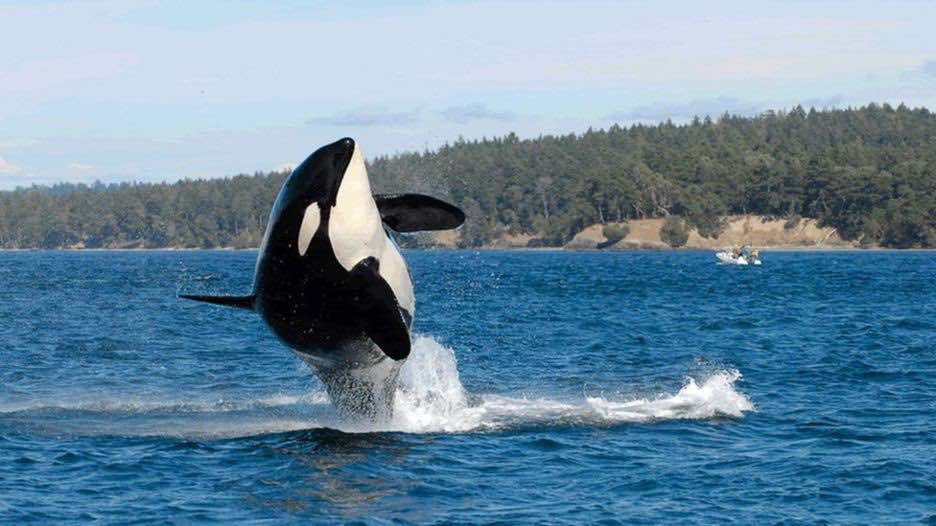forum
library
tutorial
contact

World's Oldest Known
Killer Whale Granny Dies
by Victoria Gill
BBC News, January 3, 2017
|
the film forum library tutorial contact |

|
World's Oldest Known
by Victoria Gill
|
The world's oldest known killer whale, affectionately known as Granny,
is missing and presumed dead, researchers say.
 Estimated to be over 100 years old, the matriarch's official name was J2.
Estimated to be over 100 years old, the matriarch's official name was J2.
She was the focal point of a recent BBC documentary that followed biologists' study of her clan of orcas, an effort to unravel an evolutionary mystery.
Studying female orcas, which live long beyond their reproductive years, has revealed insights into the menopause.
Menopause mystery
Only three mammals are known to experience menopause - orcas, short-finned pilot whales and humans. Even our closest ape cousins, chimpanzees, do not go through it. Their fertility peters out with age and, in the wild, they seldom live beyond childbearing years.
Following Granny and other matriarch killer whales has shown their crucial role within the family group. They guide the pod as it forages, take care of other females' young calves and even feed the larger males.
These post-reproductive female leaders help their families to survive, and the advantage they offer could show what drives a species to evolve to stop reproducing.
This research continues, but an icon of the most well-studied killer whale population on the planet will no longer be part of it.
Prof Darren Croft from the University of Exeter, UK, who leads this evolutionary biology research, told BBC News: "It was inevitable that this day was going to come but it is very sad news and a further blow to this population."
He explained that in her later years she had "been helping her family group to survive by sharing her knowledge of when and where to find food."
Orca census
The orcas of an area known as the Salish Sea - close to Vancouver and Seattle - have been the subject of a four decades long study led by Dr Ken Balcomb from the Center for Whale Research (CWR).
Dr Balcomb started this work after a period - between 1965 and 1975 - during which killer whales were taken from the Salish Sea to supply marine parks. The predictable habits of these Southern Resident killer whales, as they are called, made them an ideal target for capture.
By observing and cataloguing the killer whales since 1976, when he first photographed Granny, Dr Balcomb exposed just how unsustainable the hunting of the whales was. He and the CWR garnered the Southern Residents protection as an endangered species.
On the centre's website, which first reported Granny's death, Dr Balcomb wrote that he last saw her on 12 October, 2016, as she swam north far ahead of the others.
"Perhaps other dedicated whale-watchers have seen her since then," he wrote, "but by year's end she is officially missing from the Southern Resident Killer Whale population, and with regret we now consider her deceased."
Prof Croft added that it was "just incredible" to think of what Granny lived through over the last century and how the world and her environment had changed over that time.
"She lived through the live captures," he told BBC News, "and in recent years her world has changed dramatically with dwindling salmon stocks and increases in shipping threatening the survival of this incredible population.
"Although J2 is gone we will continue to benefit for many decades to come, from the incredible data collected on her life over the last 40 years by the Center for Whale Research."
Starving whales
The population of Southern Residents is now estimated to be just 78 animals, as of 31 December 2016.
Numbers of salmon, which these killer whales feed on, are dwindling in the region. This has prompted Dr Balcomb to wonder if there is a future for these animals as their food supply runs down.
Related Pages:
Puget Sound Orcas Die of Starvation by Robert Moore, Mirror Daily, 11/2/16
Hungry Killer Whales Waiting for Columbia River Salmon by Giles & Stefani, Seattle Times, 3/31/16
Whales with a Dam Problem by Chelsey B. Coombs, Pacific Standard, 3/29/16
learn more on topics covered in the film
see the video
read the script
learn the songs
discussion forum
